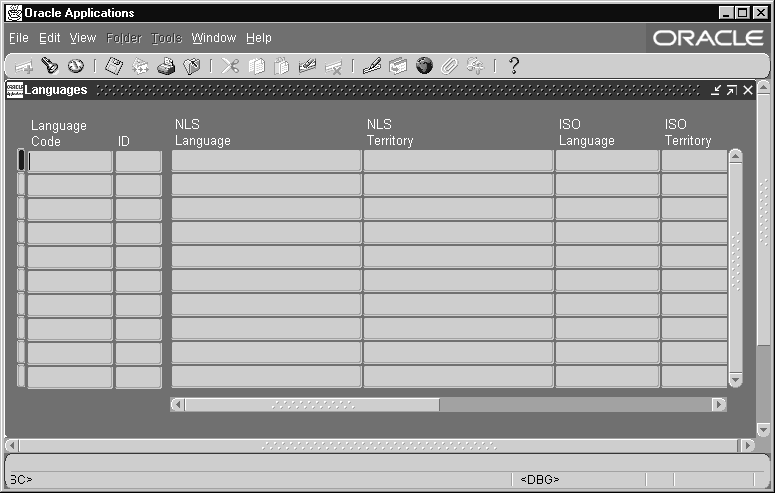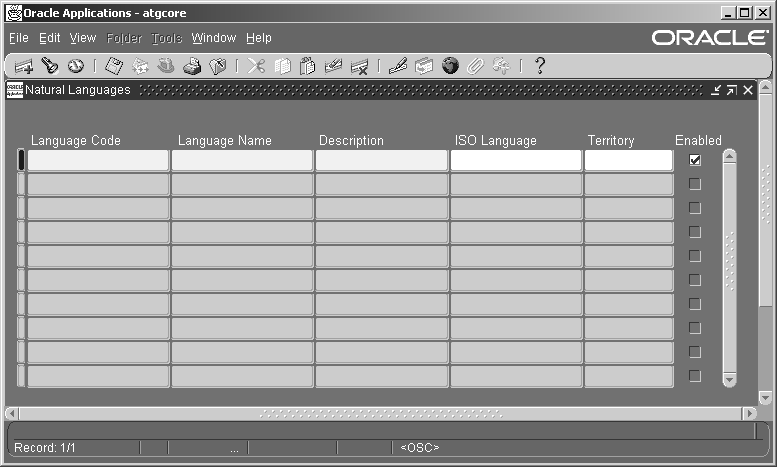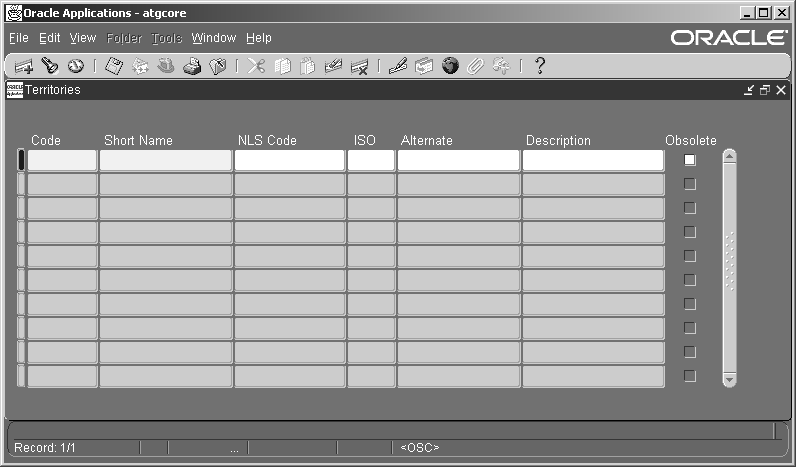Administering Globalization
Overview of Globalization Support
This chapter describes some of the features of globalization (formerly internationalization) support in Oracle E-Business Suite. Topics covered in this chapter include language values used in user sessions, behavior of month name abbreviations, and multilingual external documents. In addition, the Oracle E-Business Suite windows for Languages, Natural Languages, and Territories are described.
For additional information on globalization concepts and features in Oracle E-Business Suite, see My Oracle Support Knowledge Documents 393861.1, "Oracle E-Business Suite Release 12 Globalization Guide", and 393320.1, "Oracle E-Business Suite Release 12 Internationalization Update Notes". Also see Oracle E-Business Suite Concepts Guide.
Language Values for User Sessions
Language Values for User Sessions using AppsLocalLogin.jsp
This section describes how the language is determined for a user's session and other interactions with the system.
Login Page Language
If the language is a licensed Oracle E-Business Suite language, the initial login page language is determined from one of the following sources, in the order shown:
-
A language value passed on the AppsLocalLogin.jsp URL
-
The language used in an earlier login session
-
The browser language
If the language is not a licensed Oracle E-Business Suite language, the initial login page is in the Oracle E-Business Suite base language.
Note: The default for Single Sign-On (SSO) SSO logins will fall back to browser language preferences, in order. The default for non-SSO logins will fall back to the base language if the first language preference is not available.
The user can change the login page language selection by choosing one of the other language name icons on the login page. The language name icons on the login page represent the active languages in the Oracle E-Business Suite installation. If the user selects an alternative language, the login page is refreshed in that alternative language. Logging in and logging back out will display a URL with the correct language value. The URL can be bookmarked.
Important: In Oracle E-Business Suite Release 11.5.10, the language name icons could be hidden by setting a Local Login Mask profile option. In Release 12, this profile option is no longer available. To hide the language name icons, use the Oracle Application Framework Personalization feature.
Login Page Language and Runtime Session Language
Users must ensure that the language used for the login page is the language they want to use for their Oracle E-Business Suite runtime session. The runtime session will start in the language used in the login page. After logging in, users can, if they wish, change the runtime session language from the Preferences screen. By default, the ICX:Language profile value is not used to determine the runtime session language when logging in through the login page. However, this behavior can be modified by setting the "Applications Override SSO Server Language" profile option.
ICX:Language Profile Option
The ICX:Language profile option is used for the following:
-
Default language to use for offline with other users on the system. For example, the language to use for an e-mail notification to be sent to a user on the system, and which may be read offline from the system.
-
Default language to use for other Oracle E-Business Suite login methods besides the login page. For example, the language to use for the session language when logged in through JDeveloper.
-
Session language when the "Applications Override SSO Server Language" profile option is set to "Override SSO Server Language".
The ICX:Language profile is normally not set at user level when a given user initially starts using Oracle E-Business Suite. Regardless of whether a value exists for the profile at user level, the language chosen on the login page (the runtime session value) is not automatically saved to the ICX:Language profile value for the user. The user can either specifically set a value for the ICX:Language profile at user level after logging in, or continue to inherit the value from the higher profile value levels. A value always exists for the ICX:Language profile at site level.
Preferences Page Language Support
The current values for the runtime session language and the saved ICX:Language profile value for the user are displayed on the Preferences page.
The following updates are allowed:
-
Change only the runtime session language
-
Change only the saved ICX:Language profile value for the user
-
Change both the runtime session and the ICX:Language profile values to either the same values or different values
Language Value from Login External to Oracle E-Business Suite
This section describes language value behavior when logging into Oracle E-Business Suite from non-Oracle E-Business Suite-based login systems.
For Oracle E-Business Suite, the language used in such a non-Oracle E-Business Suite system cannot be relied on to determine the runtime session language for the Oracle E-Business Suite session. That language may not be an Oracle E-Business Suite-supported active language, and it may not be the preferred language of the user for the runtime Oracle E-Business Suite session. Therefore, the ICX:Language profile value for the user determines the Oracle E-Business Suite runtime session for that user.
Once the Oracle E-Business Suite runtime session is initiated, the user can use the Preferences page to change the runtime session language for the session. The user can also choose to change his saved ICX:Language profile value.
For an Oracle E-Business Suite environment integrated with Oracle Portal, the Oracle E-Business Suite session will inherit the portal language if the session is launched from Oracle Portal. If the portal language is not supported or enabled in Oracle E-Business Suite, the Oracle E-Business Suite session language will fall back to the Oracle E-Business Suite base language.
Language Values for Oracle Workflow Notifications
Oracle Workflow email notifications use the user-level language set in the Preferences page and also stored in the ICX:Language profile option.
Date Formats in NLS Implementations
The storage space for month name abbreviations is limited to 3 bytes. For some language and character set combinations, the month name abbreviation requires more than 3 bytes. For this reason, when a language is used in which any month name abbreviation exceeds 3 bytes in the current character set, all month name abbreviations for that language are automatically replaced by numeric representations that conform to the 3-byte space limit.
The languages affected in a UTF8 implementation are: Albanian, Bulgarian, Canadian French, Croatian, Czech, German, Greek, Hungarian, Icelandic, Polish, Russian, Simplified Chinese, Slovak, Thai, Traditional Chinese, Turkish, and Vietnamese.
The languages affected in their local character sets are: Simplified Chinese, Thai, Traditional Chinese, and Vietnamese.
Support for Calendars
By default, the calendar in the Date Picker in an application shows the Gregorian calendar. However, users can change their calendar display by setting profile options as described below.
The Hijrah and Thai Buddhist calendars are supported for Oracle Forms-based and Oracle Application Framework applications, as well as Oracle Workflow notifications, Gantt charts and other graphs, and Oracle XML Publisher reports. The support is added as an output (display) format only. Internal date object representation stays as for the Gregorian calendar. Concurrent processing and descriptive flexfields also support displaying dates in these calendars based on user preferences.
The following features are supported:
-
Users can choose a preferred calendar by setting the profile option FND: Forms User Calendar (FND_FORMS_USER_CALENDAR).
-
For the Hijrah calendar, users can display both Hijrah and Gregorian calendars by clicking on a button in the calendar window.
-
With the two calendars displayed, a user can pick a date from either the Hijrah or Gregorian calendar in Oracle Forms-based products.
-
The displayed Hijrah and Gregorian calendars are synchronized.
-
Initially, only the preferred calendar is displayed in the Date Picker.
-
-
Users can choose the first day of week in a Date Picker by setting the profile option FND: Calendar Week Start Day (FND_CALENDAR_WEEK_START_DAY).
-
Dates in a secondary calendar can be displayed as tooltip text in Oracle Forms-based products if the profile option FND: Tooltip Calendar (FND_TOOLTIP_CALENDAR).
FND: Forms User Calendar Profile Option
Users can set the FND: Forms User Calendar profile option to their preferred calendar. Valid values are:
-
Arabic Hijrah
-
English Hijrah
-
Gregorian
-
Thai Buddha
By default, the user calendar displays the Gregorian calendar, but if this profile option is set to another value, that calendar is used.
FND: Calendar Week Start Day Profile Option
Users in countries can set the FND: Calendar Week Start Day profile option to their preferred first day of the week (Sunday is the default first day of the week).
FND: Tooltip Calendar Profile Option
Users can set the FND: Tooltip Calendar profile option to a calendar other than the preferred calendar. Within the Date Picker, a given date will be displayed in this calendar's format as a tooltip.
Note: This feature applies to Oracle Forms-based products only.
Numeric Format Support
In addition to the decimal period (dot) and comma, the space ( ) and single quote (') characters are supported as number group separators. Users can choose these number group separators from the "Number Format" LOV in the Preferences Page.
Examples of formats that are supported are listed in the table below:
| Group Separator | Decimal Separator | Example |
|---|---|---|
| Comma | Period | 1, 000.00 |
| Period | Comma | 1.000,00 |
| Space | Comma | 1 000,00 |
| Single Quote | Period | 1'000.00 |
| Space | Period | 1 000.00 |
| Single Quote | Comma | 1'000,00 |
Note: The JTF applications support only the decimal period and comma as number group separators.
Multilingual External Documents
Oracle E-Business Suite ships with a set of external documents, or those documents directed toward your customers and trading partners, for which we model the data multilingually. Any document for which the data model is multilingual can be submitted, through a single request, to run in one language or in any subset of the installed languages. Your Italian customer, for example, can receive invoices printed in Italian, while your Korean customer receives packing slips printed in Korean.
Oracle Shipping
-
Bill of Lading
-
Commercial Invoice
-
Pack Slip
Oracle Order Management
-
Price List
-
Sales Order Acknowledgment
Oracle Receivables
-
Dunning Letter Print
-
Print Statements
-
Transaction Print
Oracle Purchasing
-
Printed Change Order Report (Landscape)
-
Printed Change Order Report (Portrait)
-
Printed Purchase Order Report (Landscape)
-
Printed Purchase Order Report (Portrait)
-
Printed RFQ Report (Landscape)
-
Printed RFQ Report (Portrait)
-
Dispatch Purchase Order
Oracle Sourcing
-
Negotiation PDF
Oracle Payables
-
Invalid PO Supplier Notice
-
Prepayment Remittance Notice
-
Print Invoice Notice
-
Supplier Open Balance Letter
Oracle Human Capital Management (Human Resources)
-
Full Person Details
-
Full Applicant Details
-
Full Assignment Details
-
Full Work Details
Oracle Payroll
-
Check Writer
-
Deposit Advice
-
Third Party Checks
Translations Window
In windows with an enabled translation icon, users can click on the icon to bring up a Translations window to enter or update translated values for specific records in the database. See: Creating Translations for a Record, Oracle E-Business Suite User's Guide.
Users can enter translations for multiple languages at once in the Translations window. Translated values should be entered using the Translations window.
Users should be aware of which fields are allowed to be translated. Users can click on the translation icon to identify if a field is translatable. If a user types into a field that was not meant to be translated, the value in the source language will be overwritten, and the translated value will be the only entry for that field. All users will see the data in that language, and the value in the original language will be lost.
Currencies Window
For information on how to define currencies using this window, see: Defining Currencies, Oracle General Ledger User's Guide.
Languages Window
Use the Languages window to review information about the languages available for use in Oracle E-Business Suite.
Languages Record
Each record includes the Language Code, ID, NLS Language, NLS Territory, ISO Language, ISO Territory, Default Code Set, Installed flag, Local Date Language, UTF8 Date Language, and Description.
The columns Local Date Language and UTF8 Date Language are used in date rendering. For some languages, the length in bytes of the month short name is longer than the prepared buffer in a UTF8 database; for these languages, the UTF8 Date Language is used as the date language in UTF8 environments. In databases using other character sets, the Local Date Language is used.
Natural Languages Window
The Natural Languages window allows you to review information about the languages available for use in Oracle E-Business Suite.
The Natural Languages table allows you to associate the name of a language with another entity, such as a person or company.
-
You can add new languages in this window. Prefix the language code for new languages with an 'x'.
-
You can update the enabled status of seeded languages.
-
You cannot delete saved records.
Natural Languages Record
Each record includes the Language Code, Language Name, ISO Language, and Territory for each language.
You can use Oracle Applications Manager (OAM) License Manager to enable a licensed language..
Territories Window
Use the Territories window to review and modify information for the country values used in Oracle E-Business Suite.
Territories Block
Each record includes the two-letter uppercase territory Code such as "US", the Short Name for the territory such as "United States", the NLS Code, the ISO numeric entity code, an Alternate territory code, and a longer description (Description), such as "United States of America".
Normally you would not want to update the seeded data that comes with your products, but you may wish to modify the way the country is represented in List of Values through out your applications.
You can update the description of the Territory to change the territory value displayed in List of Values used in Oracle E-Business Suite products.


